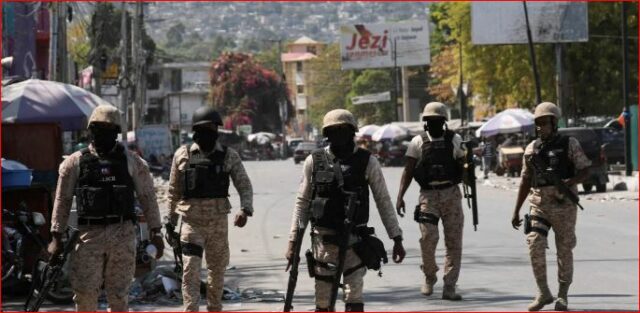PORT-AU-PRINCE: Haiti’s Prime Minister Ariel Henry resigned on Thursday and a transitional council took power with the aim of returning stability to a country where gang violence has caused chaos and misery.
Henry’s former finance minister, Michel Patrick Boisvert, will be interim prime minister.
“Today is an important day in the life of our dear republic, this day in effect opens a view to a solution… to the multidimensional crises the country faces,” Boisvert said after the formal swearing-in of the nine-person transitional council on Thursday morning.
The swearing-in of Transitional Presidential Council members represents a vital step in Haiti's return to inclusive governance. We commend all participants for their commitment to pursue compromise and work together to improve the lives of all Haitians. -BAN
— Brian A. Nichols (@WHAAsstSecty) April 25, 2024
“The swearing-in of Transitional Presidential Council members represents a vital step in Haiti’s return to inclusive governance,” Brian A. Nichols, Assistant Secretary for Western Hemisphere Affairs at the U.S. State Department, said on social network X.
Top police and military officials and members of the transitional council stood behind Boisvert during the ceremony, hosted at the prime minister’s office known as Villa d’Accueil, which was surrounded by military and a security detail.
Henry announced last month he would resign once the council was in place. He left Haiti in February to seek international help for police in their battles with armed and powerful gangs. But he was left stranded outside the country as the gangs threatened to completely take over the capital. Struggling to return, Henry announced his intended resignation.
Boisvert had served as acting prime minister in Henry’s absence.
The transitional government’s mandate runs until February 2026, by when there are slated to be elections, and cannot be renewed.
The White House on Thursday welcomed the announcement, saying the transitional council taking power in Haiti marked a step towards free and fair elections.
But the path to getting to elections was long, and there were already tensions within the council as different factions jostled for power, said Diego Da Rin, an analyst with the International Crisis Group.
“Despite the installation, there is still a long and rocky road ahead for the council to be able to forge a government,” Da Rin said. “Crucially, the council now needs to vote for one of the nine members to head the body. Then, in time, it must appoint a new non-interim prime minister, a new cabinet, a truth and reconciliation commission and a provisional electoral commission.”
The naming of the council is also seen as key step towards the deployment of a multinational security mission in Haiti. Kenya had offered to head that mission but then put it on pause as the security situation deteriorated, saying it would re-evaluate once a new government was in place.
⚠️ Today, an American military aircraft flew 20 donated pallets of Pedialyte oral rehydration solution for Hope for Haiti from the US to Toussaint Louverture International Airport in Port-au-Prince, #Haiti. This is the first humanitarian flight since the airport's closure. pic.twitter.com/VXTFRW6Zqu
— Hope for Haiti (@HopeforHaiti) April 25, 2024
U.N. Secretary-General Antonio Guterres called for the multinational force to happen quickly to help tackle the “dire” situation, his spokesperson said on Thursday.
Gang violence, which has been a problem in Haiti for years, escalated earlier this year. More than 2,500 people were killed or injured in gang violence from January through March, recent data from the United Nations Integrated Office in Haiti showed. The security situation has also displaced thousands and caused catastrophic hunger.
(REUTERS)
In a career spanning three decades and counting, Ramananda (Ram to his friends) has been the foreign editor of The Telegraph, Outlook Magazine and the New Indian Express. He helped set up rediff.com’s editorial operations in San Jose and New York, helmed sify.com, and was the founder editor of India.com.
His work has featured in national and international publications like the Al Jazeera Centre for Studies, Global Times and Ashahi Shimbun. But his one constant over all these years, he says, has been the attempt to understand rising India’s place in the world.
He can rustle up a mean salad, his oil-less pepper chicken is to die for, and all it takes is some beer and rhythm and blues to rock his soul.
Talk to him about foreign and strategic affairs, media, South Asia, China, and of course India.





